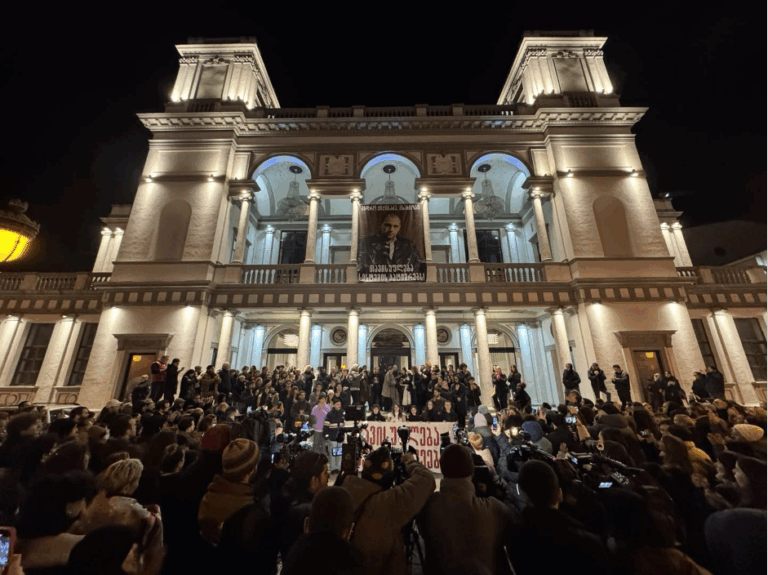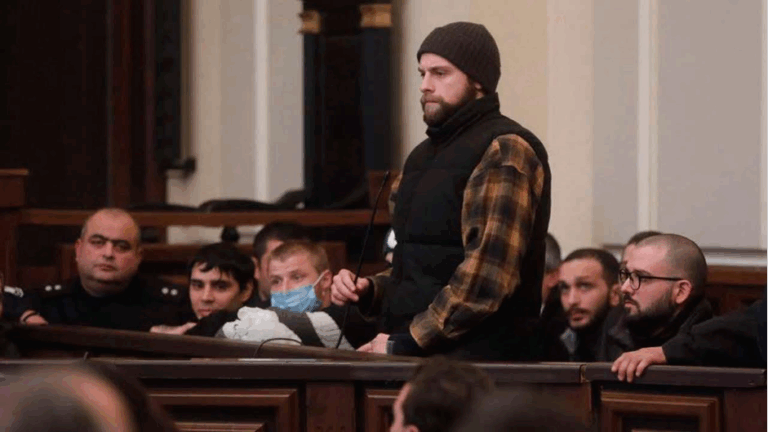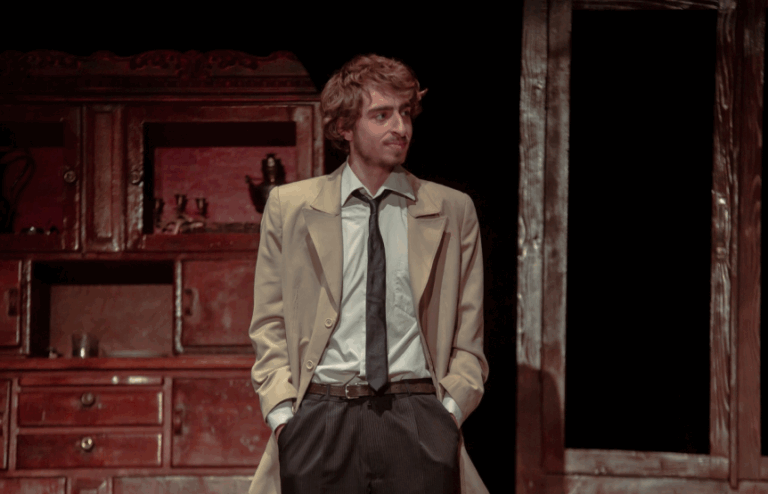Author: OC Media
Since the anti-government protests in Georgia began in early winter of last year, Tbilisi’s imperiled theatre scene has come together to defend their field.

Vaso Abashidze New Theatre, Manifest performance and protest – © New Theatre archives
An Actor’s Arrest
On December 5th, 2024, one of Georgia’s most successful working actors, Andro Chichinadze, was arrested in his home. Along with five other individuals, he was charged with ‘organising, leading, participating in, and publicly calling for violent actions.’
“The theatre scene in Georgia is very little,” actor Buka Tolordava explains—he worked with Chichinadze on season 2 of the Cavea+ TV show Changing Signs. “Every theatre-working person knows each other. We are a very tight-knit community.”
The night of Chichinadze’s arrest, Tolordava and a crowd of fellow actors and theatre workers gathered outside his detention facility, along with Chichinadze’s family and friends. “We were applauding him to let him know that we are here, we are right beside you,” he says.
Like many of his colleagues, Chichinadze had been attending the protests outside the Georgian Parliament building on Tbilisi’s Rustaveli Avenue, following the questionable re-election of the incumbent Georgian Dream party on October 26th. The streets erupted in earnest 24 days later, when Prime Minister Irakli Kobakhidze announced that the government would be halting Georgia's EU accession talks until 2028.
In the weeks and months that followed, thousands of people filled Tbilisi’s main thoroughfare every evening. Police in masks—offering critical anonymity in a city where everyone knows everyone—dealt brutally with the protesters, deploying tear gas, water canons, rubber bullets, intimidation, sexual harassment, and straightforward beatings. Many people were arrested.
Marches and Strikes
The theatre was at the forefront of these demonstrations from the very beginning, organising several collective marches. After a performance of Hamlet at the Karaki Theatre on November 18th, the actors urged the audience to join them. In full period costume and make-up, they descended from the stage and walked with their audience to Rustaveli to meet the tear gas and water cannons.
Charges were filed against Chichinadze and the five others on December 6th, the day after they were arrested. The judge ruled to remand all six to pre-trial detention until their hearing, citing ‘a totality of evidence’ and risks of the defendants’ absconding or committing new offences.
According to Transparency International (TI) Georgia, one chapter of the international anti-corruption organisation, Georgia has a history of unlawful use of pre-trial detention. ‘The court can impose pretrial detention only if the objectives of the preventive measure cannot be achieved by less restrictive means,’ TI Georgia wrote in a statement on January 3rd.
‘The prosecution failed [in the case of all six defendants] to present any evidence that would convince an objective observer of the reality of these risks, relying instead on general and abstract arguments.’

Andro Chichinadze – © Vaso Abashidze New Theatre archives
Chichinadze is one of a handful of working Georgian actors to have garnered international attention. Like many Georgian actors, Chichinadze has had a varied career. He has acted in TV shows, films, and on the stage, and was a member of the Vaso Abashidze New Theatre in Marjanishvili. After his arrest, the director of the New Theatre, Davit Doiashvili, announced that the troupe would begin a tour of Georgia’s regions with a symbolic performance, titled Manifest, informing the public about Chichinadze’s arrest and campaigning for free speech.
Like Chichinadze, “Georgian culture is also imprisoned,” Doiashvili stated at the time.
The rest of Tbilisi’s small theatre scene hаd gone on strike, hoping to inspire other fields to do the same. They demanded the release of Chichinadze and other prisoners detained in relation to the protests, whose number was creeping up all the time.
As they remained on strike, freelance actors and workers suffered the most due to the irregularity of their work. Many were supported financially by the actor’s guild, but the money couldn’t last.
“Emotionally, it was a very tough time,” actor Anuki Bubuteishvili, who also knows Chichinadze personally, tells OC Media. “But at the same time I’ve never seen my profession and theatre workers so united.”
At the beginning of March, the court again ruled to keep Chichinadze and the other defendants in custody. In the courtroom, Chichinadze says: “It’s a very strange process… It reminded me of Jozef K., a character from Kafka, who is undergoing a trial but has no idea what is happening to him. This novel is about uncertainty […] I always wondered how this feeling could be brought to life in practice, and somehow it happened, and it’s quite strange.”
Around a month afterwards, on April 16th, it was announced that Doiashvili had been dismissed from his position as director of the New Theatre on grounds of failing to fulfil the theatre’s ‘founding objectives’ and for theatrical inactivity, despite a flow of state funding. In reality, Doiashvili and his troupe had been busy rehearsing two new plays. At the time, the Georgian Young Lawyers Association states: “the regime has normalised the purging of professionals across various fields in an attempt to suppress legitimate protest in the country, intimidate the public, and enforce submission.”
A Return to Work and Artistic Protest
Theatre Director Gega Gagnidze had, in December, already begun planning a new play based on Franz Kafka’s The Trial. Slowly, after three months of protest and unemployment, actors and directors began to work again.
“For these two or three months I couldn’t do anything, I was not doing my job, I couldn’t say what I wanted to say, and I was very stressed and frustrated,” Gagnidze tells OC Media.
With this new play, Joseph (after the protagonist in Kafka’s work) which is currently showing at the Theatre on Atonali in Tbilisi, Gagnidze feels a sense of catharsis: “I said everything I wanted to say.”
Bubuteishvili feels similarly about the termination of the strike. “Everyone slowly decided to use their art form as a form of protest,” she says. “If I deprive myself of my job, which is so influential in this sense, then the only person this does harm to is me, and what’s the point?,” she questions.

Buka Tolodorava — © Beka Tsirekidze
She and others began to feel that by refusing to make art, they were inadvertently serving the interests of the ruling party. According to Bubuteishvili, many of the projects initiated since the strikes ended are satirical. “We live in very dramatic, tragic times,” she says, “the absurdity of the situation leaves no room for other genres.”
Gagnidze shares similar sentiments: “when you turn on your TV and watch people in court, when you go to Rustaveli—you can’t create anything more dramatic, and because of this you have to try a different genre.”
Chichinadze’s friends and colleagues were variably optimistic about his release, several citing the recent case of 21-year-old Mate Devidze, who was sentenced to four years in prison for waving a stick at a police officer. All felt confident, however, that a return to work and to creativity was the most effective form of dissent available to them.
“The first role we played with the strike was the big message, and the second role we have to play is to make art […] because now six months have passed, and people now are just scrolling past bad news […] they are very tired, and it’s like self-defence, psychological defence,” Gagnidze says. “We have to create art about this situation to help people to connect with reality, to start engaging with it again.”
This fractious relationship between the Georgian government and the arts is likely to persist and perhaps worsen, but it seems to have fomented a real determination within directors and actors. As it stands, no one is willing to fill Doiashvili’s position at the Vaso Abashidze New Theatre—after all, it was Doiashvili’s creation, and Doiashvili who made it “the most relevant theatre in Georgia,” as Bubuteishvili puts it.
It is hoped that Chichinadze will finally be tried in August.
“You either know of him and respect him, or you know him and adore him,” Bubuteishvili says. “I guess you couldn’t pick a better person to be a symbol of this rebellion than Andro.”
Published on July 15th, 2025
About the author:
OC Media (Open Caucasus Media) brings news from the North and South Caucasus, going beyond the headlines to have in-depth analysis of the issues, movements, conflicts, and people shaping the region.
Subscribe to the OC Culture Dispatch, a newsletter to receive free, biweekly selection of film, book, and music recommendations from the Caucasus. OC Media’s team offers a varied selection of hidden gems, cherished classics, and notable new releases from all over the region, included in their newsletter.